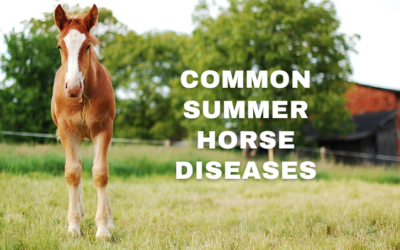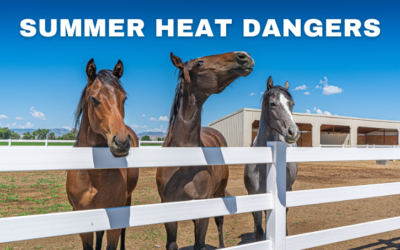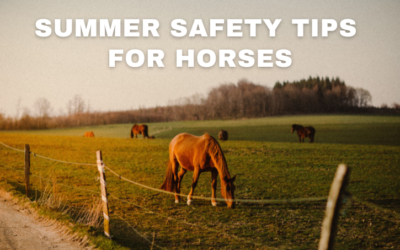Equine Articles
Common Summer Horse Diseases
Summer is in full swing, and it’s essential to make your horse’s health a priority. Warm summer temperatures can increase your horse’s risk of...
Summer Heat Dangers
Rising temperatures can be tough on your horse. As the summer heats up, it's essential to understand the dangers of extreme heat and how it can...
Summer Safety Tips for Horses
Summer is an excellent opportunity to get out and spend some quality time with your horse. However, the summer heat can pose significant risks to...
How to Care for Your Horse’s Hooves During the Winter
It can be easy to overlook hoof care in the winter, as many riders exercise their horses less and focus on their weight during the colder months....
Lacerations/Wounds
If you have horses, you know the trouble that they can sometimes get themselves in no matter how careful you are. A laceration is a wound that...
Wellness Examination
Besides a medical history, the next most important piece of information regarding your horse’s health is a physical examination. Just like humans, a...
Ophthalmic Emergencies
Ophthalmic emergencies can range from a simple squint to a punctured globe or torn eyelid. With horses, simple ophthalmic issues can quickly turn...
New Foal and Mare Examinations
During pregnancy, you should work with your veterinarian to have periodic evaluations to ensure mare and foal are progressing appropriately and both...
Lameness
A lameness evaluation involves the determination of location, structure, prognosis, and treatment options for any horse that is off/lame. History...
Immunization
Vaccinations are an important part of preventive health care and serve to minimize the risk of infection; it is important, however, to clarify that...
Fever
A normal temperature for an adult horse ranges from 99.0-101.5 degrees Fahrenheit, therefore, anything over 101.5*F is considered a fever. There are...
Down Horse
There are numerous reasons why a horse may be down, some of which are very serious. Any horse that is recumbent and cannot rise unassisted is an...
Deworming
Traditional deworming strategies have been revisited, subsequently leading to changes in how we view both parasites and their control. We have...
Dentistry
Dental care is one of the foundation pillars of preventive medicine to ensure your horse’s health. Loss of teeth and other dental problems play a...
Colic
Colic is a word that is used to describe abdominal pain in horses but actually has numerous causes. Every case is unique in how it presents but...
Choke
Choking in horses is very different from the same term used in humans. In horses, choke is when food becomes lodged in the esophagus. In contrast to...
Fever
A normal, temperature for an adult horse is 98.0 — 102.5 degrees Fahrenheit. High-grade fevers and low-grade fevers are managed differently. A...
Foaling Difficulties
There is a lot to take into consideration with a mare in labor. With all of the below mentioned considerations, please remember to keep yourself...
Lacerations
A laceration is a wound involving the skin and potentially the structures underneath it. Some lacerations can be very serious and should be...
Eye Emergencies
Any eye that is squinting, swollen, red, cloudy, gooey, teary, and/or just “looks weird” should receive veterinary treatment immediately. Eye...





